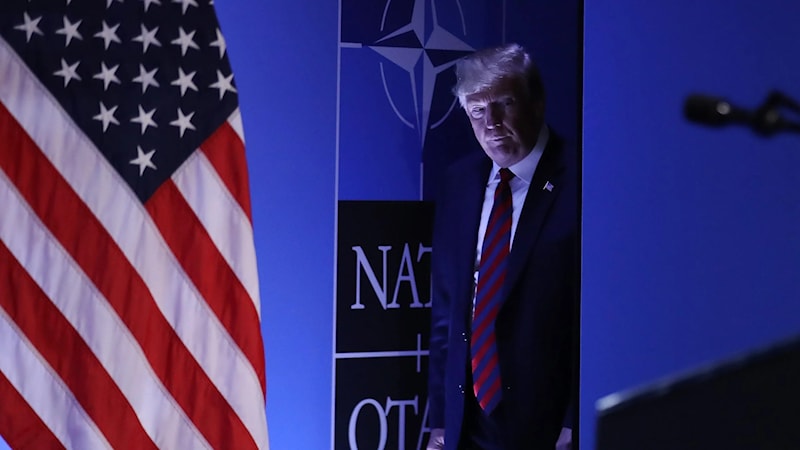Europe fears end of US alliance amid Trump-Biden face-off: WashPo
Trump, to some European critics, is an existential threat to NATO as he is seen as a beneficial tool for Russia who stands to undermine the West and its security.
-

Former US President Donald Trump arrives to speak to the media at a press conference on the second day of the 2018 NATO Summit on July 12, 2018 in Brussels, Belgium. (AFP/Getty Images)
The NATO alliance has been shaken by US former president Donald Trump’s comments and latest rhetoric, especially after he said he would encourage Russia to attack its members if they fail to pay their bills.
The comment “set off fresh tremors across Washington and in European countries already worried about America’s reliability as an ally in a potential second Trump administration,” the Washington Post reported.
Trump has long been a critic of current President Joe Biden’s endless cash support for Ukraine as a costly burden on the American taxpayer and has influenced the blocking of Biden's attempts to allocate around $61 billion for Ukraine.
Norbert Röttgen, a senior German lawmaker and former chairman of the foreign affairs committee in the German parliament, posted on his Facebook page: “Everyone should watch this video from Trump and then understand that Europe may soon have no choice but to defend itself,” adding: “We have to manage this because anything else would be surrender and self-abandonment!”
Trump, to some European critics, is an existential threat to NATO.
Marko Mihkelson, the chairman of the foreign affairs committee of Estonia, told WashPo: “The current presidential campaign only confirms that he has not changed his reckless attitude towards allies,” noting: “Unfortunately, he is therefore a very convenient tool for Putin’s Russia, which is waging war against the West.”
In a statement, NATO Secretary General Jens Stoltenberg warned that proposing “that allies will not defend each other undermines all of our security, including that of the US, and puts American and European soldiers at increased risk”.
Trump worries NATO, Biden stirs global anger
Even though Biden has a much better chance at winning the trust of Europe, NATO and the collective West, his most recent position regarding "Israel's" war on Gaza has been stirring up some criticism and confusion.
EU foreign policy Josep Borrell did not even spare a minute to jab the US during a talk with reporters Monday, gesturing to Biden’s comment that "Israel’s" strategy was “over the top”.
“How many times have you heard the most prominent leaders and foreign ministers around the world saying too many people are being killed?” he expressed, noting: “If the international community believes that this is a slaughter, that too many people are being killed, maybe we have to think about the provision of arms”.
“President Biden has said this [killing] is too much, said it is not proportional.... Well if you believe that too many people are being killed maybe you should provide less arms in order to prevent so many people being killed. That is logical,” said Borrell.
Read more: Borrell says NATO not 'à la carte' depending on US President's mood
Meanwhile, a Dutch appeals court mandated the Netherlands government to cease the supply of F-35 fighter jet parts to "Israel" due to concerns about their use in potential violations of international law.
Tipping the scales
The court order from the International Court of Justice (ICJ) requiring Israel to take steps to better protect civilian life in Gaza has also brought up controversies in the West.
The death toll in the war, which has now exceeded 28,000 martyrs, sparked fury at "Israel’s" Western enablers for their selective thoughts toward the “rules-based international order”, especially as the war in Gaza has exposed selective humanitarianism and bias in serving justice.
Last month, Mohamed ElBaradei, former Egyptian diplomat and former head of the UN atomic agency, wrote in a column, “The Arab and Muslim world has lost faith in perceived Western norms: International law and institutions, human rights, and democratic values,”
“In their view, the West itself is showing that brute force trumps all else.”
The Guardian columnist Nesrine Malik said, “When a less safe world becomes an acceptable price to pay for loyalty to allies, the West’s claim to authority as a political and military custodian of law and order looks increasingly tenuous”.
Read next: The World v. 'Israel': Is Justice Really Blind?
Renad Mansour of Britain’s Chatham House think tank says that if the international order “publicly fails once again... by proving incapable of agreeing an end to the unprecedented bloodshed in Gaza, it will further undermine the world’s faith in the institutions that were built to serve it, and possibly contribute to its complete unraveling. Western leaders should think very hard about this historic moment and what might come next.”
"Israel" has until February 23 to deliver a report to the ICJ regarding its compliance with the six orders issued. It is required to "take all measures within its power to prevent and punish the direct and public incitement to commit genocide" against Palestinians in Gaza after proof was found of "discernibly genocidal and dehumanizing rhetoric coming from senior Israeli government officials."

 5 Min Read
5 Min Read










